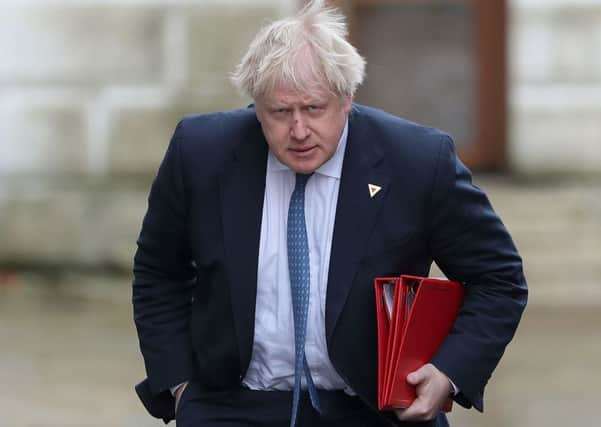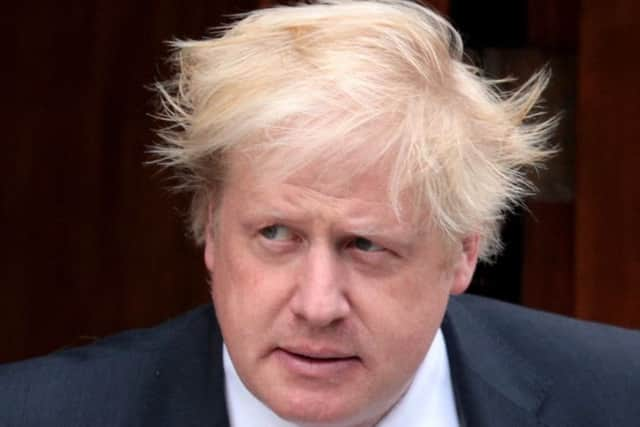Euan McColm: At the mercy of ideologues who won't face facts


The economist John Maynard Keynes is often quoted as responding to a challenge over a shifted position by saying, “When the facts change, I change my mind.” There is some debate over whether Keynes ever actually uttered those words – or a variation of them – but regardless of their provenance, they contain a simple wisdom.
No matter how strongly we might hold a belief, when presented with evidence that it is wrong, we must be prepared to change our minds. Otherwise, how can we progress? Scientific discovery would cease, self-examination would become redundant, conmen would have countless barrels of fish to pop off.
Advertisement
Hide AdAdvertisement
Hide AdIn this, the new age of the ideologue, open minds seem more scarce than ever. Across the political spectrum, dogmatism is the in-thing; to give ground, even in the face of overwhelming evidence that one is wrong, is unthinkable.


The Labour Party is controlled entirely by ideologues. Leader Jeremy Corbyn and those closest to him, whether elected members, special advisers, or party officials, have remained true to beliefs cemented in their teens.
Their belief in the efficacy of far-left politics is absolute. Some of those closest to the Leader of the Opposition are communists. As ideologies go, communism is one of the strictest, don’t you think?
The Labour Party’s anti-Semitism crisis is an inevitable result of the leader’s ideology. If your lifelong position has been that the “imperialist West” is a force for bad, there is a danger that among your fellow travellers will be some who hold extreme views.
Such entanglements have brought Corbyn to where he now stands, leader of a Labour Party that has lost the trust of most of British Jewry.
So rigid is Corbyn’s belief system that he has always been blind to the flaws of those he considers allies. In many instances he has embraced anti-Semites, prizing their opposition to the West over anything else.
Prime Minister Theresa May is not, I think, a rigid ideologue. The Conservative Party, however, is being run by right-wing dogmatists. The pro-Brexit members of her parliamentary group hold sway. The PM has no option but to deliver an outcome that she doesn’t believe in but that is the only thing that matters to these colleagues.
Last week, former foreign secretary and current unspeakable charlatan Boris Johnson wrote a newspaper column in which he stated that women wearing the burqa looked like letterboxes or bank robbers. It was a horrible example of Johnson thoughtlessly punching down.
Advertisement
Hide AdAdvertisement
Hide AdRegardless of whether Johnson’s words were a deliberate dog whistle to the far right or simply an example of a populist newspaper columnist trying, ineptly, to pep up his latest piece without considering the consequences, the reaction among those who share his pro-Brexit position has been informative.
The Prime Minister and the Conservative Party chairman may both have condemned Johnson’s language (only the latest, let’s not forget, in a line of nasty Johnsonian remarks that includes that time he wrote about “piccaninnies” with “watermelon smiles”) but from Brexiteers there is nothing but support.
The real story here, they insist, is that Johnson is standing up for free-speech. And, anyway, he was defending the right to wear the burqa, so who’s the bad guy here?
The free speech argument, whether cynically deployed or not, is compelling. Our own rights in this regard depend on the rights of others to say things we might find offensive.
But there is also a fairly compelling case that Islamophobia infects the Tory right. If one’s political life has been dominated by the beliefs of an isolationist nature, it’s likely that among one’s comrades will be those whose views are unpalatable.
Labour’s anti-Semitism and the Conservatives’ Islamophobia are the twin consequences of ideologues taking control.
The rise of the ideologue has collided with a new tribalism among voters. Referendums on both Scottish independence and membership of the European Union have created deep divisions among voters. Politicians may talk of people coming together but not one of them believes that to be happening.
This tribalism means supporters of both Labour and the Conservatives devote much of their time to devising ever more contorted explanations for why their preferred politician isn’t a raging anti-Semite or Islamophobe (or an all forms of racism racist).
Advertisement
Hide AdAdvertisement
Hide AdThey organise “twitterstorms” where they agree to switch off the BBC or demand the resignation of this traitor or that heretic, and they grow ever more certain of their righteousness.
Last week a former challenger for the position of deputy leader of the SNP won a court’s backing for his assertion that his pro-independence position should be regarded as a “philosophical belief” and duly protected in law.
Councillor Christopher McEleny hasn’t done much for those in his party who wish us to believe that theirs is a peculiarly civic nationalism. Rather, he stands now as an example of the nationalist who believes in independence at any cost, the nationalist who’d live in a cave to be free.
Those who truly believe in Corbyn or Brexit do so with all of the passion with which McEleny believes in Scottish independence. Their faith cannot be shaken by facts. If anything, any challenge to their beliefs sees them doubling down. Political campaigners begin to identify as persecuted minorities.
Ideologues and their devoted followers excuse themselves from difficult debate. Their “computer says no” rigidity means there’s rarely room for nuance and never space to believe a political opponent might be acting in good faith.
We’re trapped in a political stand-off between tribes whose faith is unshakeable. The prospect of progress lies wounded in the corner.
Someone – perhaps John Maynard Keynes – once said that when the facts changed, he changed his mind.
These days, politics is dominated by people who, when the facts change, prefer find a new explanation for why those facts are wrong.